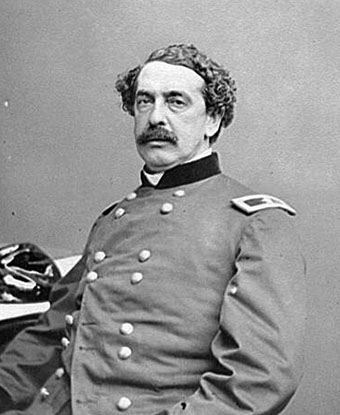Person
Abner Doubleday

Library of Congress
Abner Doubleday, mistakenly credited as the inventor of baseball, served under Major Robert Anderson at the outbreak of the Civil War and later rose to the rank of brevet major general. Doubleday was born in Ballston Spa, New York in 1819 and worked as a surveyor for railroads before attending the US Military Academy at West Point.
After graduating from West Point in 1842, Doubleday rotated through coastal garrison duties until the outbreak of the Mexican-American War, during which he served as an artillery officer, commanding a supply depot in Camargo, Mexico. His military career later took him to Florida during the Third Seminole War. His last garrison duty before the Civil War was Fort Moultrie, a sleepy base on Sullivan’s Island, South Carolina.
Doubleday, captain of Company E, First US Artillery Regiment, wrote in his memoir that Charleston in 1860 “was far from being a pleasant place for a loyal man. Almost every public assemblage was tinctured with treasonable sentiments, and toasts against the flag were always warmly applauded. As early as July there was much talk of secession, accompanied with constant drilling, and threats of taking the forts as soon as a separation should occur.” After South Carolina’s secession, Major Anderson, commander of Fort Moultrie, decided to make a fateful move. Doubleday led the first detachment of men to row from Fort Moultrie to Fort Sumter on the night of December 26, 1860.
A Republican and vocal opponent of slavery, Doubleday wanted to answer the insults to the Stars and Stripes. He advised Major Anderson to return fire when the Star of the West, an unarmed merchant vessel sent to reinforce and reprovision the Union garrison in January 1861, was fired upon by South Carolina militia. As a result of this insult to the U.S. flag, Doubleday urged Anderson to close Charleston Harbor using the fort’s guns. He also volunteered to fire the first shot at the Confederates on April 12, 1861, a 32-pound shot that bounced off the roof of the Iron Battery on Cummings Point. “To me,” Doubleday later said, “it was simply a contest, politically speaking, as to whether virtue or vice should rule.”
After four hours commanding the guns, Doubleday was relieved by Captain Truman Seymour. “Doubleday,” asked Seymour, “what is all this uproar about?”
Doubleday replied “there is a trifling difference of opinion between us and our neighbors opposite, and we are trying to settle it.”
After the defeat at Fort Sumter, Doubleday commanded men in many battles from 1862-1863: Second Battle of Bull Run (Manassas), Battle of South Mountain, Battle of Antietam (Sharpsburg), Battle of Fredericksburg, and most significantly at the Battle of Gettysburg. His stubborn defense and leadership on the first day of the battle delayed the Confederate advance and allowed more Union forces to move into commanding positions. Doubleday was relieved of command by General George Meade but still participated in the second and third days of the battle, commanding a division. He suffered a neck wound from a shell fragment in the aftermath of Pickett’s Charge.
Doubleday’s remaining Civil War service consisted of administrative duties and briefly overseeing the defense of Washington DC when forces under Confederate General Jubal Early threatened the capital. Doubleday stayed in the Army until 1873, serving in New York, California, and Texas where he commanded an all-African American unit. Doubleday retired to New Jersey where he died of heart disease in 1893.
